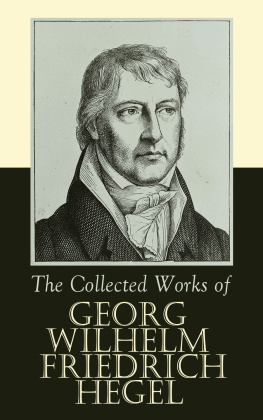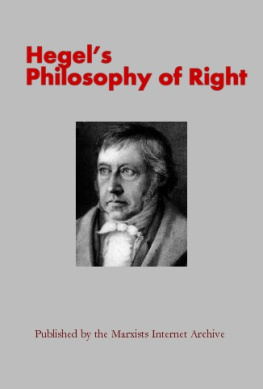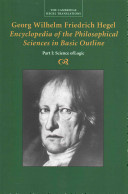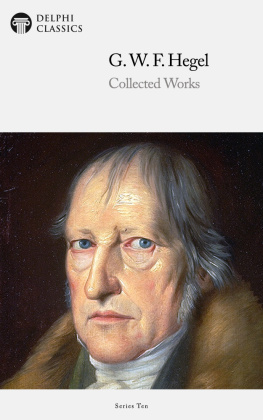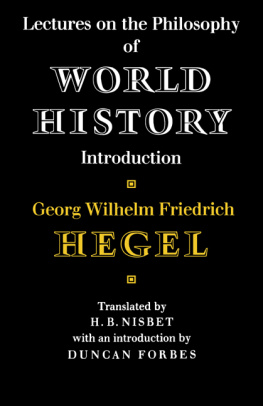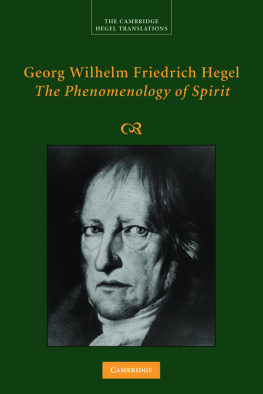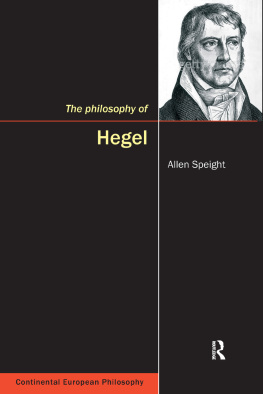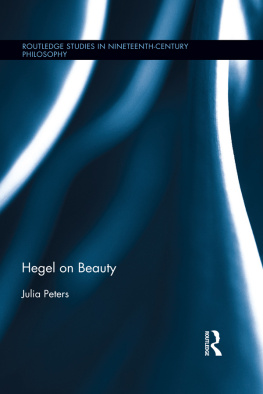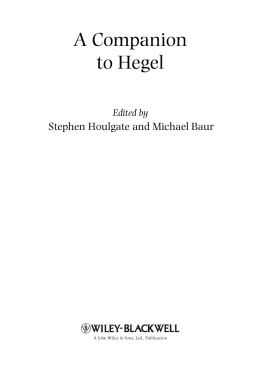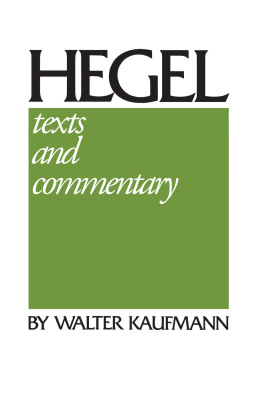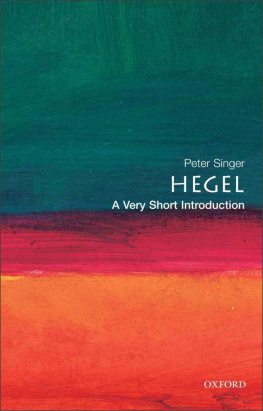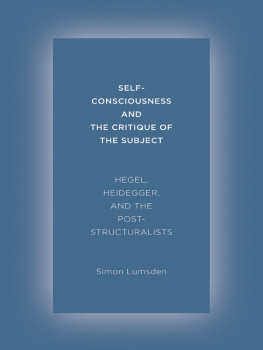Hegel - Collected Works of Georg Wilhelm Friedrich Hegel
Here you can read online Hegel - Collected Works of Georg Wilhelm Friedrich Hegel full text of the book (entire story) in english for free. Download pdf and epub, get meaning, cover and reviews about this ebook. publisher: e-artnow, genre: Science. Description of the work, (preface) as well as reviews are available. Best literature library LitArk.com created for fans of good reading and offers a wide selection of genres:
Romance novel
Science fiction
Adventure
Detective
Science
History
Home and family
Prose
Art
Politics
Computer
Non-fiction
Religion
Business
Children
Humor
Choose a favorite category and find really read worthwhile books. Enjoy immersion in the world of imagination, feel the emotions of the characters or learn something new for yourself, make an fascinating discovery.
- Book:Collected Works of Georg Wilhelm Friedrich Hegel
- Author:
- Publisher:e-artnow
- Genre:
- Rating:4 / 5
- Favourites:Add to favourites
- Your mark:
- 80
- 1
- 2
- 3
- 4
- 5
Collected Works of Georg Wilhelm Friedrich Hegel: summary, description and annotation
We offer to read an annotation, description, summary or preface (depends on what the author of the book "Collected Works of Georg Wilhelm Friedrich Hegel" wrote himself). If you haven't found the necessary information about the book — write in the comments, we will try to find it.
Hegel: author's other books
Who wrote Collected Works of Georg Wilhelm Friedrich Hegel? Find out the surname, the name of the author of the book and a list of all author's works by series.
Collected Works of Georg Wilhelm Friedrich Hegel — read online for free the complete book (whole text) full work
Below is the text of the book, divided by pages. System saving the place of the last page read, allows you to conveniently read the book "Collected Works of Georg Wilhelm Friedrich Hegel" online for free, without having to search again every time where you left off. Put a bookmark, and you can go to the page where you finished reading at any time.
Font size:
Interval:
Bookmark:
Georg Wilhelm Friedrich Hegel (17701831), German philosopher, was born at Stuttgart on the 27th of August 1770. His father, an official in the fiscal service of Wrttemberg, is not otherwise known to fame; and of his mother we hear only that she had scholarship enough to teach him the elements of Latin. He had one sister, Christiana, who died unmarried, and a brother Ludwig, who served in the campaigns of Napoleon. At the grammar school of Stuttgart, where Hegel was educated between the ages of seven and eighteen, he was not remarkable. His main productions were a diary kept at intervals during eighteen months (17851787), and translations of the Antigone, the Manual of Epictetus, &c. But the characteristic feature of his studies was the copious extracts which from this time onward he unremittingly made and preserved. This collection, alphabetically arranged, comprised annotations on classical authors, passages from newspapers, treatises on morals and mathematics from the standard works of the period. In this way he absorbed in their integrity the raw materials for elaboration. Yet as evidence that he was not merely receptive we have essays already breathing that admiration of the classical world which he never lost. His chief amusement was cards, and he began the habit of taking snuff.
In the autumn of 1788 he entered at Tbingen as a student of theology; but he showed no interest in theology: his sermons were a failure, and he found more congenial reading in the classics, on the advantages of studying which his first essay was written. After two years he took the degree of Ph.D., and in the autumn of 1793 received his theological certificate, stating him to be of good abilities, but of middling industry and knowledge, and especially deficient in philosophy.
As a student, his elderly appearance gained him the title Old man, but he took part in the walks, beer-drinking and love-making of his fellows. He gained most from intellectual intercourse with his contemporaries, the two best known of whom were J. C. F. Hlderlin and Schelling. With Hlderlin Hegel learned to feel for the old Greeks a love which grew stronger as the semi-Kantianized theology of his teachers more and more failed to interest him. With Schelling like sympathies bound him. They both protested against the political and ecclesiastical inertia of their native state, and adopted the doctrines of freedom and reason. The story which tells how the two went out one morning to dance round a tree of liberty in a meadow is an anachronism, though in keeping with their opinions.
On leaving college, he became a private tutor at Bern and lived in intellectual isolation. He was, however, far from inactive. He compiled a systematic account of the fiscal system of the canton Bern, but the main factor in his mental growth came from his study of Christianity. Under the impulse given by Lessing and Kant he turned to the original records of Christianity, and attempted to construe for himself the real significance of Christ. He wrote a life of Jesus, in which Jesus was simply the son of Joseph and Mary. He did not stop to criticize as a philologist, and ignored the miraculous. He asked for the secret contained in the conduct and sayings of this man which made him the hope of the human race. Jesus appeared as revealing the unity with God in which the Greeks in their best days unwittingly rejoiced, and as lifting the eyes of the Jews from a lawgiver who metes out punishment on the transgressor, to the destiny which in the Greek conception falls on the just no less than on the unjust.
The interest of these ideas is twofold. In Jesus Hegel finds the expression for something higher than mere morality: he finds a noble spirit which rises above the contrasts of virtue and vice into the concrete life, seeing the infinite always embracing our finitude, and proclaiming the divine which is in man and cannot be overcome by error and evil, unless the man close his eyes and ears to the godlike presence within him. In religious life, in short, he finds the principle which reconciles the opposition of the temporal mind. But, secondly, the general source of the doctrine that life is higher than all its incidents is of interest. He does not free himself from the current theology either by rational moralizing like Kant, or by bold speculative synthesis like Fichte and Schelling. He finds his panacea in the concrete life of humanity. But although he goes to the Scriptures, and tastes the mystical spirit of the medieval saints, the Christ of his conception has traits that seem borrowed from Socrates and from the heroes of Attic tragedy, who suffer much and yet smile gently on a destiny to which they were reconciled. Instead of the Hebraic doctrine of a Jesus punished for our sins, we have the Hellenic idea of a man who is calmly tranquil in the consciousness of his unity with God.
During these years Hegel kept up a slack correspondence with Schelling and Hlderlin. Schelling, already on the way to fame, kept Hegel abreast with German speculation. Both of them were intent on forcing the theologians into the daylight, and grudged them any aid they might expect from Kants postulation of God and immortality to crown the edifice of ethics. Meanwhile, Hlderlin in Jena had been following Fichtes career with an enthusiasm with which he infected Hegel.
It is pleasing to turn from these vehement struggles of thought to a tour which Hegel in company with three other tutors made through the Bernese Oberland in July and August 1796. Of this tour he left a minute diary. He was delighted with the varied play of the waterfalls, but no glamour blinded him to the squalor of Swiss peasant life. The glaciers and the rocks called forth no raptures. The spectacle of these eternally dead masses gave me nothing but the monotonous and at last tedious idea, Es ist so.
Towards the close of his engagement at Bern, Hegel had received hopes from Schelling of a post at Jena. Fortunately his friend Hlderlin, now tutor in Frankfort, secured a similar situation there for Hegel in the family of Herr Gogol, a merchant (January 1797). The new post gave him more leisure and the society he needed.
About this time he turned to questions of economics and government. He had studied Gibbon, Hume and Montesquieu in Switzerland. We now find him making extracts from the English newspapers on the Poor-Law Bill of 1796; criticising the Prussian land laws, promulgated about the same time; and writing a commentary on Sir James Steuarts Inquiry intothe Principles of Political Economy. Here, as in contemporaneous criticisms of Kants ethical writings, Hegel aims at correcting the abstract discussion of a topic by treating it in its systematic interconnexions. Church and state, law and morality, commerce and art are reduced to factors in the totality of human life, from which the specialists had isolated them.
But the best evidence of Hegels attention to contemporary politics is two unpublished essaysone of them written in 1798, On the Internal Condition of Wrttemberg in Recent Times, particularly on the Defects in the Magistracy, the other a criticism on the constitution of Germany, written, probably, not long after the peace of Lunville (1801). Both essays are critical rather than constructive. In the first Hegel showed how the supineness of the committee of estates in Wrttemberg had favoured the usurpations of the superior officials in whom the court had found compliant servants. And though he perceived the advantages of change in the constitution of the estates, he still doubted if an improved system could work in the actual conditions of his native province. The main feature in the pamphlet is the recognition that a spirit of reform is abroad. If Wrttemberg suffered from a bureaucracy tempered by despotism, the Fatherland in general suffered no less. Germany, so begins the second of these unpublished papers, is no longer a state. Referring the collapse of the empire to the retention of feudal forms and to the action of religious animosities, Hegel looked forward to reorganization by a central power (Austria) wielding the imperial army, and by a representative body elected by the geographical districts of the empire. But such an issue, he saw well, could only be the outcome of violenceof blood and iron. The philosopher did not pose as a practical statesman. He described the German empire in its nullity as a conception without existence in fact. In such a state of things it was the business of the philosopher to set forth the outlines of the coming epoch, as they were already moulding themselves into shape, amidst what the ordinary eye saw only as the disintegration of the old forms of social life.
Font size:
Interval:
Bookmark:
Similar books «Collected Works of Georg Wilhelm Friedrich Hegel»
Look at similar books to Collected Works of Georg Wilhelm Friedrich Hegel. We have selected literature similar in name and meaning in the hope of providing readers with more options to find new, interesting, not yet read works.
Discussion, reviews of the book Collected Works of Georg Wilhelm Friedrich Hegel and just readers' own opinions. Leave your comments, write what you think about the work, its meaning or the main characters. Specify what exactly you liked and what you didn't like, and why you think so.

